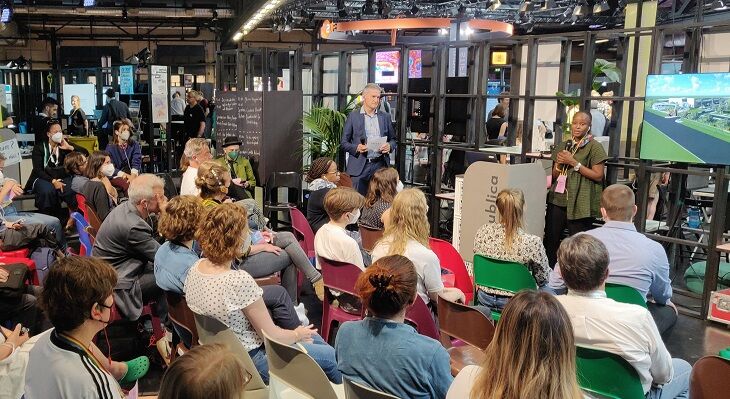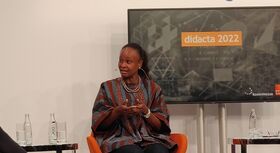Ghana beyond aid
14.07.2022
How can vocational education and training in Ghana be strengthened further, and what can be done to support the country’s development agenda? What can Germany learn from Ghana? How do educational policy issues mesh with global discourses centring on economic growth and sustainability? These were just some of the questions addressed when a representative from Ghana took part in the activities staged by GOVET at re:publica and didacta conferences.

African reality is more diverse, more innovative and more progressive than many people expect. Initiatives such as “Ghana beyond aid” are enabling the African continent to demonstrate that it is keen to take a leap forward. To what extent are general and technical education and vocational education and training part of this advancement? And what role do innovations from Africa play for Africa itself?
Acting on behalf of the Federal Ministry of Education and Research (BMBF), GOVET has been working closely with the Ghanaian Ministry and with the Commission for TVET since 2019. This commitment includes the provision of technical guidance and networking between experts. Against this background, GOVET invited the entrepreneur Elizabeth Swaniker to Germany in order to attend the re:publica and didacta conferences and to offer a specialist audience insights into the Ghanaian education system and into the African continent’s areas of potential.
Constance Swaniker founded the Design & Technology Institute (DTI) in 2016. The DTI secured a reputation as a private TVET (Technical and Vocational Education and Training) establishment within a short space of time and now delivers industrial training to young people. 130 pupils are currently completing programmes in the areas of welding and manufacturing, design innovation and entrepreneurship.
At re:publica; Ms. Swaniker gave a highly impressive report on her personal career development as a sculptor and as a fine arts graduate. She described how she trained as a joiner alongside her studies before going on to set up Accents and Arts, one of Ghana’s leading metal working and creative design companies, over 20 years ago. She made the switch to the education and training sector because of her own need for skilled workers. Trained welders had been in short supply, and it had been particularly difficult to employ women in an occupational field dominated by men. Nowadays, 30% of the participants in DTI’s technical programmes are women and girls. The DTI is, however, also seeking to strike out in new directions elsewhere. Academic researchers from the fields of education, psychology and anthropology are all involved in developing the training programmes and curricula with a view to adapting training to the local context.
Cultural and historical aspects need to be taken into account if Ghanaian vocational education and training is to be strengthened in a sustainable way.
Constance Swaniker, Founder DTI

At the didacta education fair in Cologne, Ms. Swaniker discussed the developments and requirements of the growth regions of Africa and Asia with Aditya Gupta, CEO of the India Didactics Association.
The VET systems of the two countries find themselves in a similar position. In both cases, little heed has been taken of vocational education and training over a long period of time, VET having been viewed as a second-best solution behind tertiary education. However, India and Ghana are now instigating vocational education and training reforms. Populations in the respective countries are very young, and the objectives are to facilitate better opportunities in the global economy and to counter the shortage of trained skilled workers, including in international terms.
The view expressed by Ms. Swaniker and Mr. Gupta was that modernisation of VET was the key to enabling countries like Ghana and India to seize their chance in a globalising world by using their young residents. In the absence of the opportunity of good-quality vocational training, high youth unemployment figures might otherwise become a serious problem.
Ms. Swaniker confidently asserted that Ghana and Africa had huge inherent potential in respect of the future of worldwide production. Populations were young, and the urge for further development was strong. Resilience to crises was high, and there was also the potential to skip stages of development.
_klein_rdax_280x153_80p.jpg)
Constance Swaniker gathered information from German VET cooperation stakeholders during her stay in the country. In terms of fostering innovation and entrepreneurship, the start-up hub Motionlab.Berlin and the Technical University of Berlin provided interesting insights. Reinforcing the role of women and girls in technical and male-dominated areas formed an object of debate during visits to the ABB Training Centre in Berlin and to the Hans Böckler upper secondary vocational college. There is one area in which Germany still has much to learn from other countries. The exchange of views on the demand orientation of vocational education and training and its alignment to the needs of industry clearly showed that, although the German dual system works very well, it can still look to countries such as Ghana for lessons in agility and innovative power.
When it comes to putting a sustainable vocational education and training system in place, our situation is not as comfortable as that enjoyed by Germany. We cannot spend centuries building up what Germany has achieved. Our chance lies in learning from the experiences of other countries and in gaining direct entry at a top global level. DTI is the vehicle via which we are pursuing this ambition.
Constance Swaniker, Founder DTI